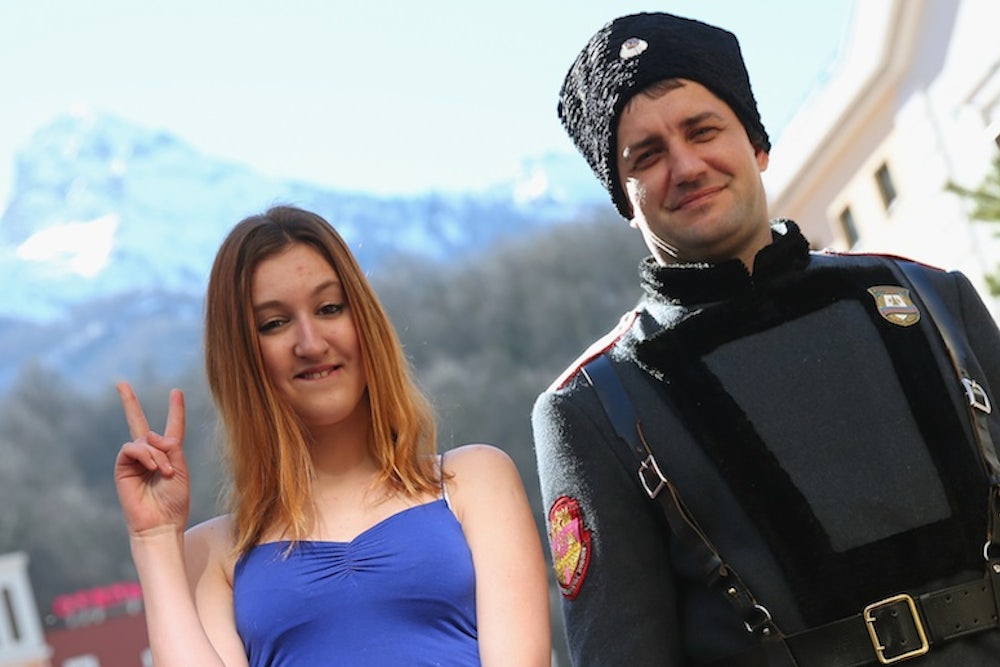Last week, a day before the Winter Olympics began, The New Republic’s Julia Ioffe took Western journalists to task for gleefully tweeting about the state of Sochi’s hotel—the broken elevators, the urine-colored tap water, the knob-less doors—writing that “a lot of this complaining does smack of some pretty fantastic schadenfreude.” She has since amended her assessment, criticizing the Russians for their "paranoid projection." But I can hardly blame them if they've been reading the Wall Street Journal, whose prolific off-the-slopes coverage makes no effort to conceal the marching orders given by the paper’s assignment editors: Mock the hosts.
Even before the games began, there were hints of what was to come. On the eve of the opening ceremony, the paper ran these two stories: “Before Putin and the Olympics, Sochi Was Scary” and “Sochi, After They Moved the Mountains.” The former described “the poverty and dislocation of Russia's '90s,” the latter a seashore “blocked by a double fence decked out with sensors and cameras and a hundred-foot-wide expanse of mud, stagnant water, broken concrete blocks and discarded cigarette packs.” In other words, Sochi used to suck, and now it sucks a little less.
But since its qualified praise of the opening ceremony—"a spectacular if at certain moments scrubbed tour through Russia's history”—the Journal has published more than two dozen negative stories about Sochi that have nothing to do with the competition itself.
I’m not talking about the stray-dog culling, computer hacking (aka “cyber war zone”), unfinished construction projects, unsafe mountain conditions, terrorism concerns, the Great Chobani Blockade of 2014, or very un-winter weather. Many other outlets have reported those stories, too (though the Journal is more obsessed with the warm, slushy conditions than perhaps any other outlet). Instead, they’ve gone out of their way to make fun of Sochi, reporting on fake street plants (“Hopefully Sochi skating fans will find real flowers to throw on the ice during the women’s figure skating long program.”); the paucity of foreigners at the opening ceremony (“an informal survey” that involved watching “nearly 1,000 fans … stroll into Fisht Olympic Stadium wearing visible team colors”); a docked Greek cruise ship that might provide “some of the best accommodations at the 2014 Winter Olympics”; security officers “dressed a bit like Barney”; and the culinary failure of the concession stands’ “Brooklyn” and “Manhatten” hot dogs (“My first bite was my last. It did not feel like home.”).
Sometimes even the headline is withering, as in “Sochi Fails to Medal in Merchandising” (“In an age of hypercommercialization, it seems impossible that an event like the Olympics would be under-merchandised. But this is Russia.”); “Russia's Ban on Alcohol in Arenas Leaves Drinkers Flat” (“Russia, whose most famous export may be vodka, is staging the driest Olympics in memory. For many fans, it is the biggest upset of the Winter Games.”); “And the Sochi Crowd Goes Mild” (“The hundreds of thousands of Russians with tickets to the Winter Games have so far been more stoic than stoked, more Bolshoi than Boston Garden.”); and “Shape Up Sochi” (“The Olympics are supposed to inspire people to shape up and go for their inner gold, right? In Russia, that’s a big ‘if.’ A quarter of men here die before they’re 55, largely from drinking too much vodka. More than 60% of men and 22% of women over 15 smoke.”).
But this video by reporter Jeff Bush takes the cake. He ventured a couple of miles outside of Sochi to a spot called “Draft Beer and Fish” where, he narrates sarcastically, beer is “artfully drawn into plastic bottles to go, or poured into plastic cups to dine in,” and is paired with dried fish. He calls the male owner “a Russian entrepreneur of sorts” and describes the “robust” female server as “a woman whose bad side I think you don’t want to get on”—even though she’s shown smiling at the very moment Bush says this. And when he's being shown how to eat the fish, Bush turns to the camera and says, right in front his gracious hosts, “My cameraperson’s about to be sick.”
There is plenty to criticize about Russia through the lens of Sochi, like the three-year sentence given to an environmental activist or the tightening of the country’s anti-gay adoption ban, and other newspapers of less-conservative persuasions have also run reports that reflect poorly on the host nation. But the Journal’s condescending cultural rubbernecking, their single-minded obsession with reinforcing Russian stereotypes and making the hosts look like bumbling idiots, is achieving exactly the opposite of the intended effect: It’s reinforcing the stereotype of the Ugly American tourist—the rudest, most ungrateful guest on the planet.
